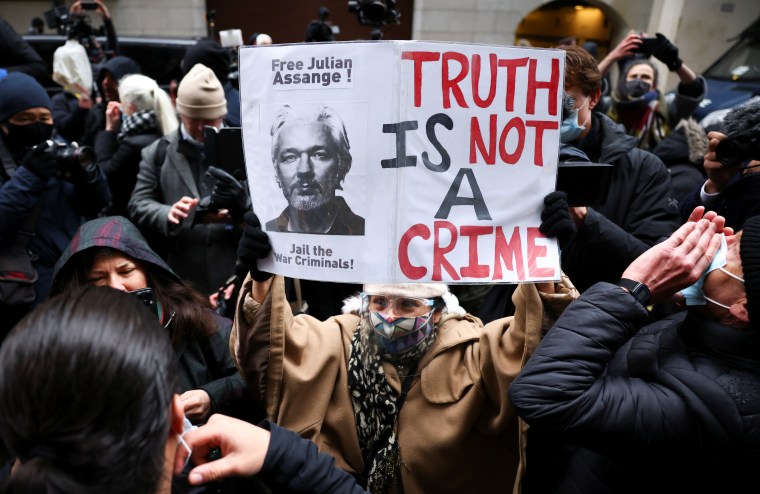A London court’s decision this week not to extradite WikiLeaks founder Julian Assange to the United States imperils press freedom even as it benefits Assange.
In her January 4 decision, Judge Vanessa Baraister ruled that Assange would be at risk of suicide should he be extradited to the U.S. to face criminal prosecution, including on espionage charges. But she did not outright reject the Justice Department’s case against Assange, which press freedom advocates, including CPJ, say criminalizes some newsgathering practices. On January 6 the same judge denied Assange bail.
“The ruling’s protection is limited to Assange himself. It’s not going to help the next journalist or publisher,” Jameel Jaffer, the executive director of the Knight First Amendment Institute at Columbia University, told CPJ via phone. “The decision turned on the specifics of Assange’s case, and in particular his mental health and the conditions in which he would be held if he was returned to the United States.”
In her decision, Baraister briefly discussed the defense’s claim that the charges against Assange threaten press freedom. Referencing a European court decision from a previous case, she wrote, “notwithstanding the vital role played by the media in a democratic society, journalists cannot, in principle, be released from their duty to obey the ordinary criminal law…”
The ruling has individual journalists concerned. William Goodwin, the investigations editor at Computer Weekly, said that as a U.K. citizen working in London, he was well aware of the implications of the extradition trial while reporting on it. If all that is standing between Assange, who is Australian, and his extradition is his mental health, then journalists without a similar defense could be left vulnerable if they find themselves in the same position.
“With the ruling, there’s nothing to stop the U.S. from attempting to extradite a journalist in the U.K. for publishing classified U.S. documents that they obtained from a source,” Goodwin told CPJ via phone. “It’s that sort of precedent that’s hanging over us. It’s holding a gun to the head of investigative journalism.”
The U.S. has until January 18 to file an appeal, which an attorney for the U.S. is already in the process of drafting, according to Bloomberg. It is unclear, however, if the administration of President-elect Joe Biden, which takes over the White House two days after that deadline, will continue to pursue the case against Assange.
In 2010 and 2011, WikiLeaks released hundreds of thousands of U.S. diplomatic cables and military reports relating to the wars in Afghanistan and Iraq as well as practices at the U.S. detention facility in Guantanamo Bay, Cuba.
The U.S. extradition request stems from 18 criminal charges the Department of Justice, under President Donald Trump, disclosed in 2019. Prosecutors allege that Assange unlawfully published the names of classified sources and conspired with former U.S. Army intelligence analyst Chelsea Manning to obtain classified information. (Manning was convicted in 2013 on espionage charges related to the leaks.)
Seventeen of the charges against Assange are under the 1917 Espionage Act, which has been increasingly used by the Department of Justice to prosecute whistle blowers, according to CPJ research. The other charge is under the Computer Fraud and Abuse Act and claims that Assange “encouraged” Manning to leak classified information. The alleged violations carry a combined punishment of 175 years in prison, according to reports.
Journalists have long debated whether Assange, who has collaborated with traditional outlets and whose leaks have sparked investigations in major publications, is himself a journalist. (CPJ does not categorize him as such.) Regardless, press freedom advocates, including CPJ, say the cases against Assange have huge implications for the profession as Assange’s activities – such as communicating with government sources for classified information, and asking follow-up questions which might prompt more digging – are typical journalistic activities.
“At the end of the day, the indictment focuses largely on activities that journalists engage in all the time and more importantly the actual charges, the actual counts of the indictments focus on activities that journalists engage in all the time,” Jaffer said.
If Assange is not extradited, U.S. prosecutors will not be able to pursue a case against him, or establish a legal precedent of using the Espionage Act or Computer Fraud and Abuse Act to prosecute journalistic activity in U.S. courts.
“The worry has always been that, once a legal precedent to prosecute journalists with the Espionage Act is on the books, any administration could use that precedent to go after journalists at The New York Times, The Washington Post, or essentially anywhere,” Trevor Timm, co-founder and executive director of the Freedom of the Press Foundation told CPJ via phone. “My hope is that they won’t try this again anytime soon, though the risk is certainly there,” said Timm, who also served as an expert witness in Assange’s extradition trial.
James Ball, a London-based global editor at the Bureau of Investigative Journalism, who briefly worked at WikiLeaks, agreed: “You’ve got to look at what happens to figures on the fringe because what happens to them today, is what happens to establishment journalists tomorrow,” he told CPJ via phone.
